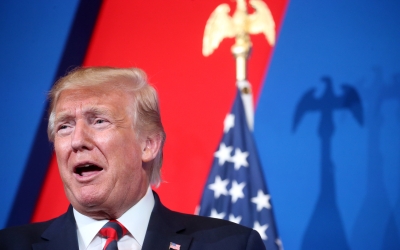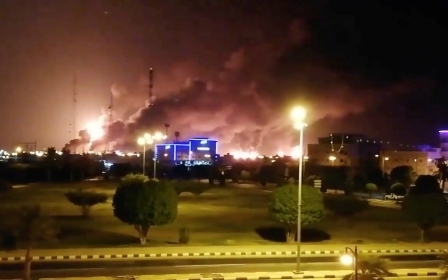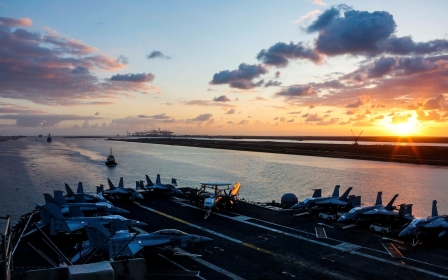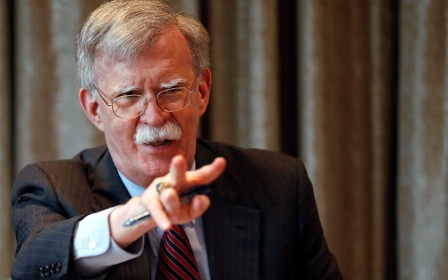'I don't want war with anybody': Trump rolls back on clash with Iran after Saudi oil blast
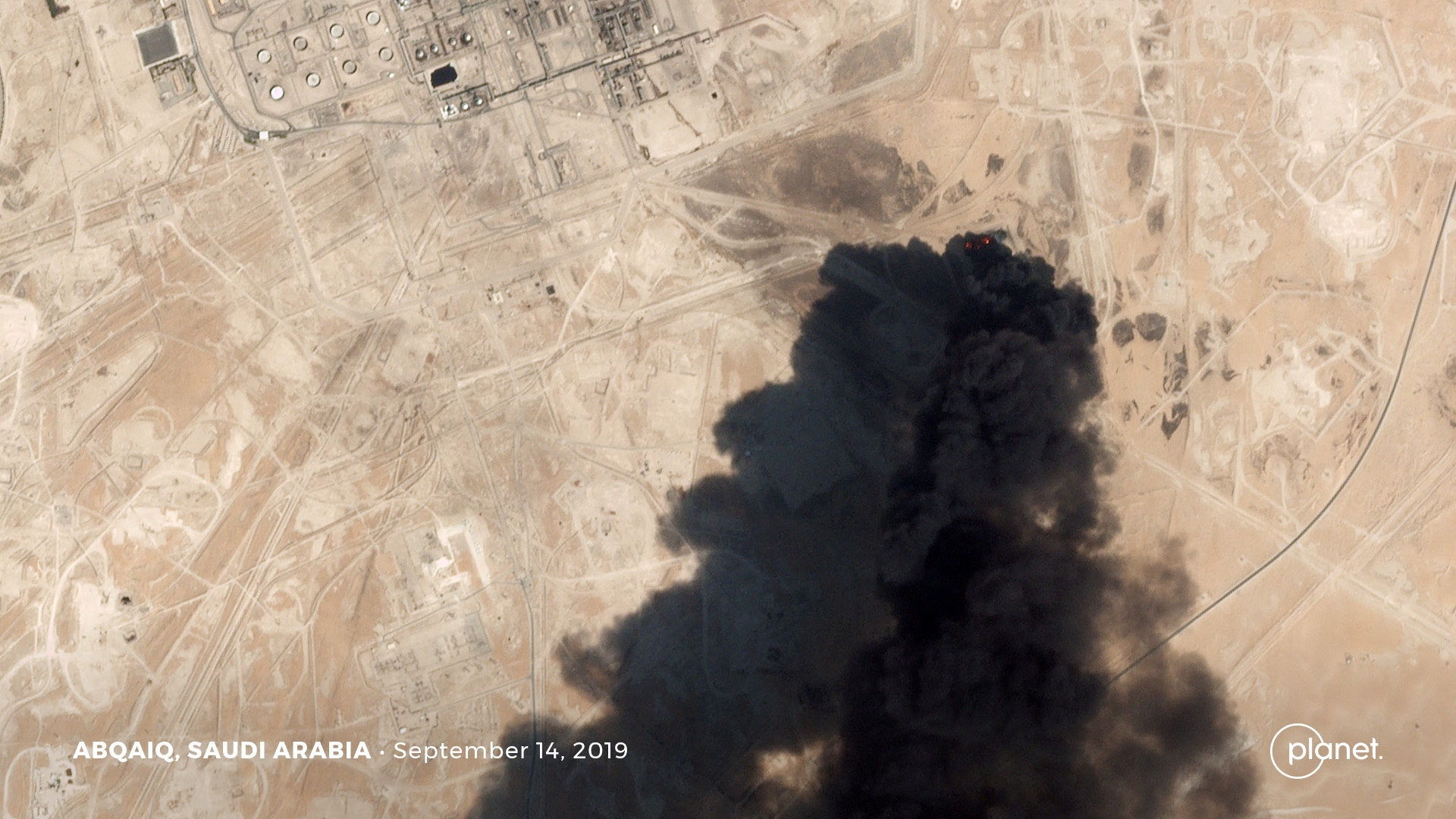
Less than 24 hours after saying the US was "locked and loaded" after an attack on Saudi oil facilities, Donald Trump has said he is not seeking military conflict in the Middle East.
Speaking to reporters on Monday after meeting Bahrain's Crown Prince Salman bin Hamad Al-Khalifa, Trump said he will be dispatching his Secretary of State Mike Pompeo to Saudi Arabia.
Asked if he thinks Iran was behind the attacks on the oil facilities, Trump said: "It's looking that way… As soon as we find out definitely, we'll let you know."
Still, he insisted that he is not looking for a military confrontation with Iran.
"I don't want war with anybody. I'm somebody that would like not to have war," Trump told reporters.
The US president added that he is not looking at military options to attack Iran at the moment.
"We want to find definitively who did this," he said.
'They've been a great ally… Saudi Arabia pays cash'
- Donald Trump
Yemen's Houthi rebels had claimed responsibility for the attacks on Saturday, but Trump and Pompeo were quick to point the finger at Tehran.
"Tehran is behind nearly 100 attacks on Saudi Arabia while [Hassan] Rouhani and [Javad] Zarif pretend to engage in diplomacy," Pompeo wrote on Twitter on Saturday.
"Amid all the calls for de-escalation, Iran has now launched an unprecedented attack on the world's energy supply. There is no evidence the attacks came from Yemen."
Details about the weapons used in the attacks and the locations from which they were launched remain unclear.
Iraqi intelligence sources told Middle East Eye on Sunday that drones used in the attack were launched from southern Iraq.
Unidentified US officials told US media outlets on Monday that the attack was launched from Iranian territories.
Earlier on Monday, US Secretary of Defense Mark Esper also blamed Iran directly for the attack.
"The United States military, with our interagency team, is working with our partners to address this unprecedented attack and defend the international rules-based order that is being undermined by Iran," he said.
On Tuesday, Iran's Supreme Leader Ayatollah Ali Khamenei ruled out negotiations with the US.
"The policy of 'maximum pressure' against the Iranian nation is worthless and all Islamic Republic of Iran officials unanimously believe there will be no negotiations with the US at any level," he said, quoted on his official website
Riyadh calls for UN investigators
Later in the day, the Saudi Foreign Ministry said the attacks, which halted 50 percent of the kingdom's oil output, employed Iranian weapons, but an investigation to determine the source of the bombing is still underway.
Riyadh said the primary target of the attacks was the "global energy supply", adding that it will invite UN experts to investigate the incident.
"The kingdom affirms strongly that it is able to protect its territories and people and respond firmly to these aggressions," the Foreign Ministry's statement said.
Saudi Arabia pays cash
For his part, Trump said the attack on Saudi Arabia is not an attack on the United States, but he stressed that his administration is cooperating with Riyadh, praising Saudi rulers for their arms deals with Washington.
"That was an attack on Saudi Arabia, and that wasn't an attack on us, but we would certainly help them," he said.
"They've been a great ally. They spent $400 billion over the past number of years… Saudi Arabia pays cash."
The US president also noted that the US military is ready for war if conflict breaks out.
"The United States is more prepared than any country in the history of - in any history - if we have to go that way. As to whether or not we go that way, we'll see," he said.
But the US president said diplomacy is not exhausted with Iran, predicting that talks will work out at "some point".
Tensions
The US administration left the multilateral Iran nuclear deal in May 2018, and since then, Washington has been imposing crippling sanctions on Iranian industries and individuals.
The nuclear agreement, signed by Tehran, Washington and major world powers, had seen Iran scale back its atomic programme in exchange for the lifting of sanctions against its economy.
Iran calls the reimposition of sanctions a form of "economic terrorism".
Tensions between Iran and the United States have been intensifying since Washington quit the deal.
'Yemeni people are exercising their legitimate right of defence'
- Hassan Rouhani
The two countries were on the verge of military confrontation in June when Trump authorised - then called off - US strikes against Iran after Iranian forces shot down a US drone that Tehran said was flying over Iranian territory.
"I'm not looking to get into new conflict, but sometimes you have to," Trump said on Monday.
Iran has continued to deny responsibility for Saturday's attacks. On Monday, President Rouhani said the Houthis carried out the operation in response to the Saudi-led war in Yemen, which has killed thousands of people and devastated the entire country.
"Yemeni people are exercising their legitimate right of defence... the attacks were a reciprocal response to aggression against Yemen for years," Rouhani told reporters in Ankara after a summit with his Russian and Turkish counterparts.
But a spokesman for the Saudi-led coalition in Yemen denied the Houthi claim on Monday.
"The terrorist attack did not originate from Yemen as the Houthi militia claimed," Colonel Turki al-Malki told reporters in Riyadh, as Reuters reported.
Middle East Eye propose une couverture et une analyse indépendantes et incomparables du Moyen-Orient, de l’Afrique du Nord et d’autres régions du monde. Pour en savoir plus sur la reprise de ce contenu et les frais qui s’appliquent, veuillez remplir ce formulaire [en anglais]. Pour en savoir plus sur MEE, cliquez ici [en anglais].


